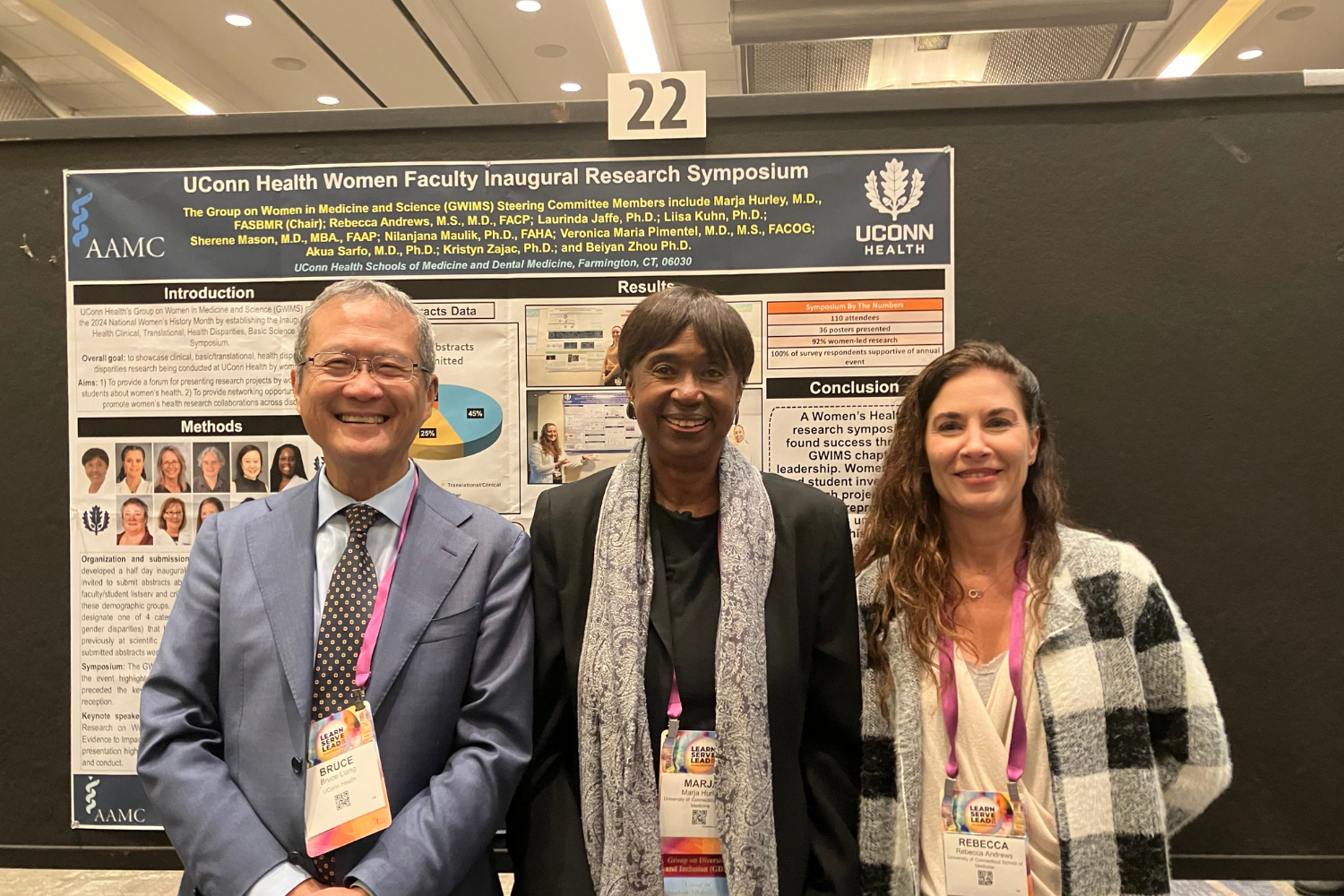Dr. Tricia Leahey, professor in the Department of Allied Health Sciences in the College of Agriculture, Health and Natural Resources (CAHNR), has been named the permanent director of UConn’s Institute for Collaboration on Health, Intervention, and Policy (InCHIP).
On Tuesday, Aug. 29, UConn interim Vice President for Research, Innovation, and Entrepreneurship Pamir Alpay announced that Leahey will assume permanent duties as director. She had served as interim director since August 2022.

InCHIP is a large multidisciplinary University-wide research institute with more than 120 principal investigators (PIs) from nearly every school and college across UConn. InCHIP has an active research portfolio of $92.3 million. InCHIP was founded in 2002 as a center for HIV research by Distinguished Professor Emeritus of psychological sciences Jeffrey Fisher and has since expanded to focus on health broadly.
As interim director, Leahey is focused on broadening research development services to students, increasing diversity in science, and expanding the institute’s international and national reputation.
“Tricia Leahey is a brilliant researcher who has dedicated her work to improving public health in Connecticut and across the country. As interim director of InCHIP, she has carried on a legacy of excellence befitting an institute that brings together the best in interdisciplinary research at UConn. Under her directorship, there is no limit to the positive impact that InCHIP can continue to make,” Alpay says.
Leahey succeeds Director Amy Gorin, who was promoted to Vice Provost for Health Sciences and Interdisciplinary Initiatives. Gorin was appointed as InCHIP Director in 2018, following Fisher’s retirement.
“UConn is lucky to have such a distinguished scholar and talented leader in Tricia Leahey as the new Director of InCHIP. Tricia is well respected as an innovative researcher and dedicated mentor in the obesity field. As a clinical health psychologist and active NIH-funded PI, she has a clear sense of the future of social and behavioral health sciences. Tricia brings to InCHIP a vision centered around advancing our research methodologies as well as a strong commitment to student and faculty development. InCHIP will thrive under Tricia’s leadership, and I am thrilled to work with her in this new role,” says Gorin.
Under Fisher and Gorin’s leadership, InCHIP expanded its scientific footprint, grants portfolio, and expertise in novel health interventions. As the new director, Leahey seeks to build upon this progress to strategically position InCHIP as an international leader in the prevention and treatment of chronic diseases with the use of innovative methodology and technology, while encouraging continued cross-campus collaboration.
“InCHIP has experienced substantial growth over the past 20 years, from a center for HIV research to a cross-campus social and behavioral health sciences institute. I am eager to build upon Jeff and Amy’s work to continue growing InCHIP and its reputation as a leader in the prevention and treatment of chronic diseases. I am thrilled to work with InCHIP PIs and staff in this new role,” says Leahey.
Leahey is a renowned clinical health psychologist and obesity treatment researcher who has focused on developing affordable lifestyle interventions for obesity treatment and testing innovative strategies for weight loss maintenance.
“Tricia is a true leader. She understands where the science is, and where it will be going. She also knows how to prepare the next generation to be difference makers in improving health,” says Justin Nash, Department Head of the Department of Allied Health Sciences.
Leahey has been a PI at InCHIP for nearly a decade and has cultivated meaningful relationships with InCHIP faculty and centers through innovative collaborations and problem-solving ability.
“Tricia is the ideal person to be the director of InCHIP and I look forward to working with her. I’ve always been impressed by her talent as a researcher and her flexible problem-solving skills. She brings both a long history with InCHIP and an openness to innovation which will ensure that InCHIP continues to thrive at UConn,” says Marlene Schwartz, Director of the UConn Rudd Center for Food Policy and Health.
In May, Leahey presented her vision and strategic plan for InCHIP to the UConn Research leadership team and Provost’s Office. In alignment with UConn President Radenka Maric’s goals, Leahey’s vision to advance human health and health policy research at UConn will place particular focus on building up collaborations around chronic disease management and advanced methodologies. Leahey’s plan has the potential to increase UConn’s research enterprise, including contributing to its goal to gain membership in the Association of American Universities (AAU), directly improve local, national, and international communities, and grow Connecticut’s economy.
Leahey joined UConn’s Department of Allied Health Sciences in 2014 as an associate professor. InCHIP was one of the factors that influenced her decision to join UConn. Before coming to UConn, Leahey was an assistant professor in Brown University’s Department of Psychiatry and Human Behavior.
Alongside Gorin, Leahey has served as co-director of UConn’s Weight Management Research Group since 2014. She has been PI of several multi-million-dollar National Institutes of Health (NIH)-funded clinical trials and her research has been continually funded by the NIH since receiving her Ph.D. in 2008. She is currently the PI on an NIH trial examining the efficacy of a technology-mediated weight management program for individuals with socioeconomic disadvantages.
In addition to her research and teaching responsibilities, she has mentored InCHIP affiliates applying for NIH K Awards and faculty in InCHIP’s Grant Writing Bootcamp. A dedicated mentor and educator, Leahey has received UConn’s Teaching Excellence Award and Brown University’s Psychology Research Mentor Award.
Leahey has served as a standing member of the NIH’s Psychosocial Risk and Disease Prevention Study Section, as Chair or Co-Chair of NIH grant review panels, and on editorial boards of several scientific journals. Her research has been featured in major news outlets including NPR, The Wall Street Journal, Time Magazine, Forbes, and more.



